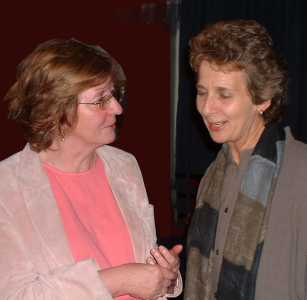
For the second night in succession, the Literary Festival met to consider how books can bring back to life women from history: but with a difference -as the switch of location may suggest Jane Glover, one of the world's most eminent conductors and one of the few females in her profession, has lived all her life with Mozart, but has only now expressed that attachment through words rather than through music. Yet, as she told Alison Lister, this was not so much a new departure as a closing of the circle: when she started at Oxford University, she considered switching to study English; and it was clear as she traced her interest in Mozart that Mozart's Women is, in more than one sense, the book of a lifetime.
Jane Glover has been fascinated by Mozart since childhood; she did not come from a particularly musical family, but they had some Mozart, and when she learned to play, here, too, was Mozart - and she quoted Artur Schnabel's remark that "The sonatas of Mozart are unique: too easy for children, too difficult for adults". Mozart has recurred throughout her professional life, from Glyndebourne to her television series about him. It was clear, as she traced this line, that the idea of writing about Mozart had been with her from a long time. But one of the central themes of the book was present even before she began to dream of writing it: not only had Jane Glover known, as a child, that Mozart had a sister, Maria Anna (Nannerl), who was, like him, a musical prodigy, who toured the capitals of Europe with him: in fact, she identified with Nannerl. Later, she spoke with feeling about what happened after that triumphal tour, when Nannerl was left at home while father and son went off to Italy.
Another motive for writing about Mozart seems to have been a desire to counter balance the influence of Peter Shaffer's Amadeus: Jane Glover praises the play as "a brilliant essay on genius and mediocrity", and says that the way Shaffer writes about music is enviable. But he distorts the character of Mozart in order to expound his theme, and if he does Mozart no favours, he does Constanze, Mozart's wife, a monumental injustice. The enormous success of the film of Amadeus, and a simplistic tendency to see it as a biopic, a literal biography of the composer, means that many errors have been added to the myths which surround him. One motive for writing seems to be a simple desire to see Constanze accorded the respect due to her.
Constanze was the more interesting in that she was one of four sisters, all highly talented musicians; Jane Glover describes them as "the musical Brontë sisters", and at one point considered collaborating with the novelist Elizabeth Jane Howard to write a play about them for television, to be called, rather cheekily, she admitted, Four Sisters. Mozart was deeply impressed by the Weber family. He fell in love at first, not with Constanze herself, but with her sister Aloysia, who became one of the great singers of her time. Writing about this family was hard to resist, although Jane Glover stresses that "It's not a feminist book, it's just a book. It doesn't neglect men, it just brings the women back into the foreground where they belong."

Ultimately, rather than choose between all these extraordinary women, she wrote a book which brought them all together. At the centre of that book, and of the relationships between these women, is a man, Wolfgang Amadeus Mozart. And since the 250th anniversary of that man's birth will be celebrated next year, it was time to stop hesitating, and plunge into that book. Jane Glover was modest about her scholarship as a biographer, emphasising that she had not worked from original documents but from published material. All of Mozart's letters have been published "thank goodness", though not all of them in English. Again and again as she spoke it was evident, though she did not boast of it, that what qualified her to write this book was her familiarity with and sensitive to the music; she described Mozart's letters, for example, as "symphonic in structure". He was a great improvisor, she explained, and just as he developed a theme in his symphonies, so he did the verbal equivalent in his letters. He had written to his dying father:
As death, when we come to consider it closely, is the true goal of our existence, I have formed during the last few years such close relationships with this best and truest friend of mankind that death's image is not only no longer terrifying to me, but is indeed very soothing and consoling, and I thank my God for graciously granting me the opportunity... of learning that death is the key which unlocks the door to our true happiness. I never lie down at night without reflecting that - young as I am - I may not live to see another day. Yet no one of all my acquaintances could say that in company I am morose or disgruntled.and this extraordinary letter had become part of her understanding of Mozart's Requiem Mass.
 |
 |
| Previous report: Wendy Robertson Mary S. Lovell & Margaret Elphinstone |
Next Report: Ian McMillan |

